Ever marveled at a Mesquite wood piece? Ever wondered, is Mesquite truly a hardwood? Dive in and discover!
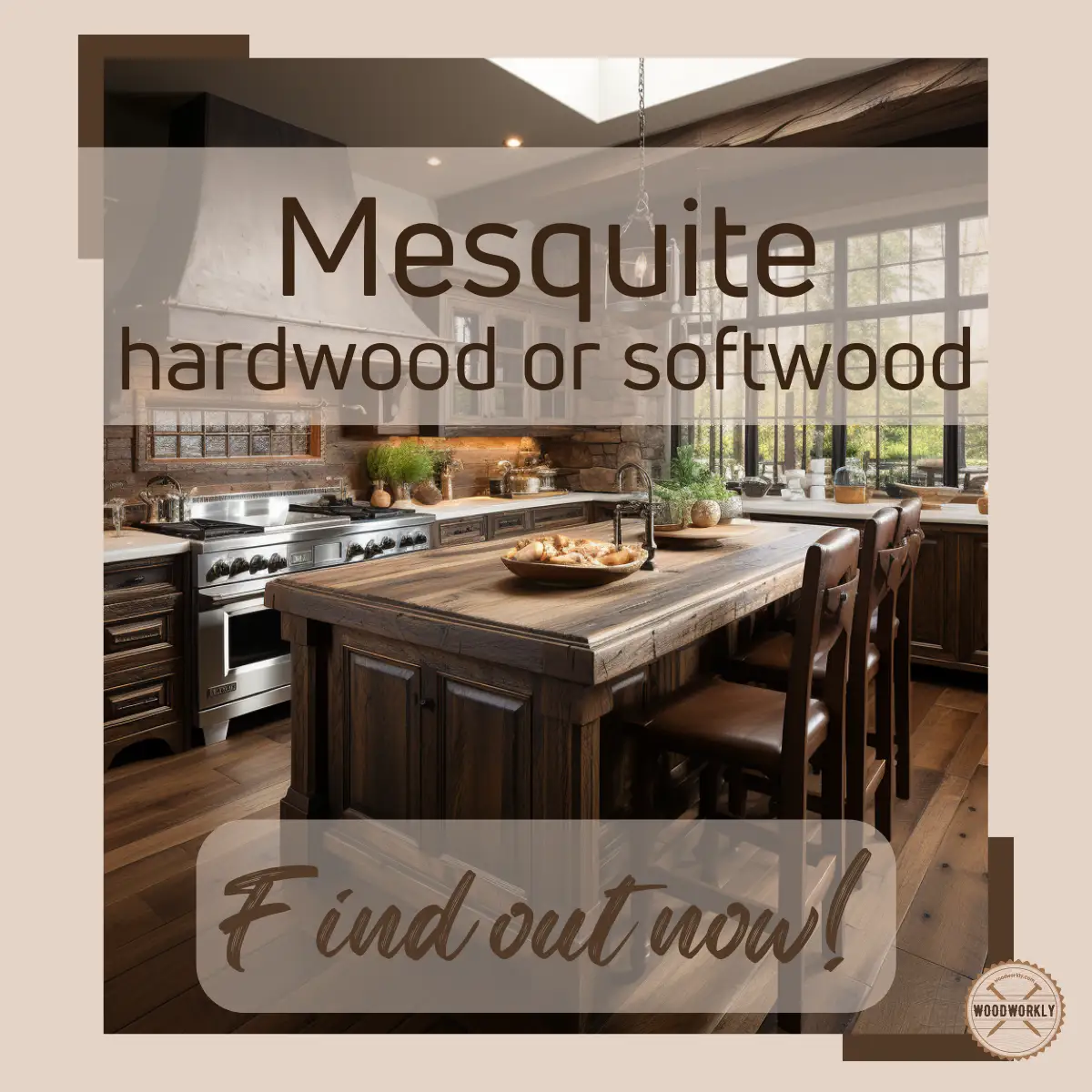
Mesquite wood is mainly used for making furniture, fences, tool handles, decorative items, and many other woodworking projects.
When I was first working with Mesquite wood on a heavy-duty project, I was curious about its hardness.
So, I started some digging and eventually, learned so many things about the hardness of this cool lumber.
So, let’s discuss, Is Mesquite a hardwood?
Yes, Mesquite is a hardwood with excellent strength, toughness, and density. Mesquite has a Janka hardness rating of 2,340 lbf (10,410 N) which is significantly harder than most domestic hardwoods. Mesquite comes from deciduous hardwood trees, and it is the hardest North American wood.
But there’s more to know about the hardness of Mesquite wood.

In this article, I’ll explore, is Mesquite a hardwood, how hard Mesquite is compared to other wood types, characteristics of Mesquite wood with all the pros and cons.
Furthermore, I’ll answer some frequently asked questions as well.
Let’s jump in!
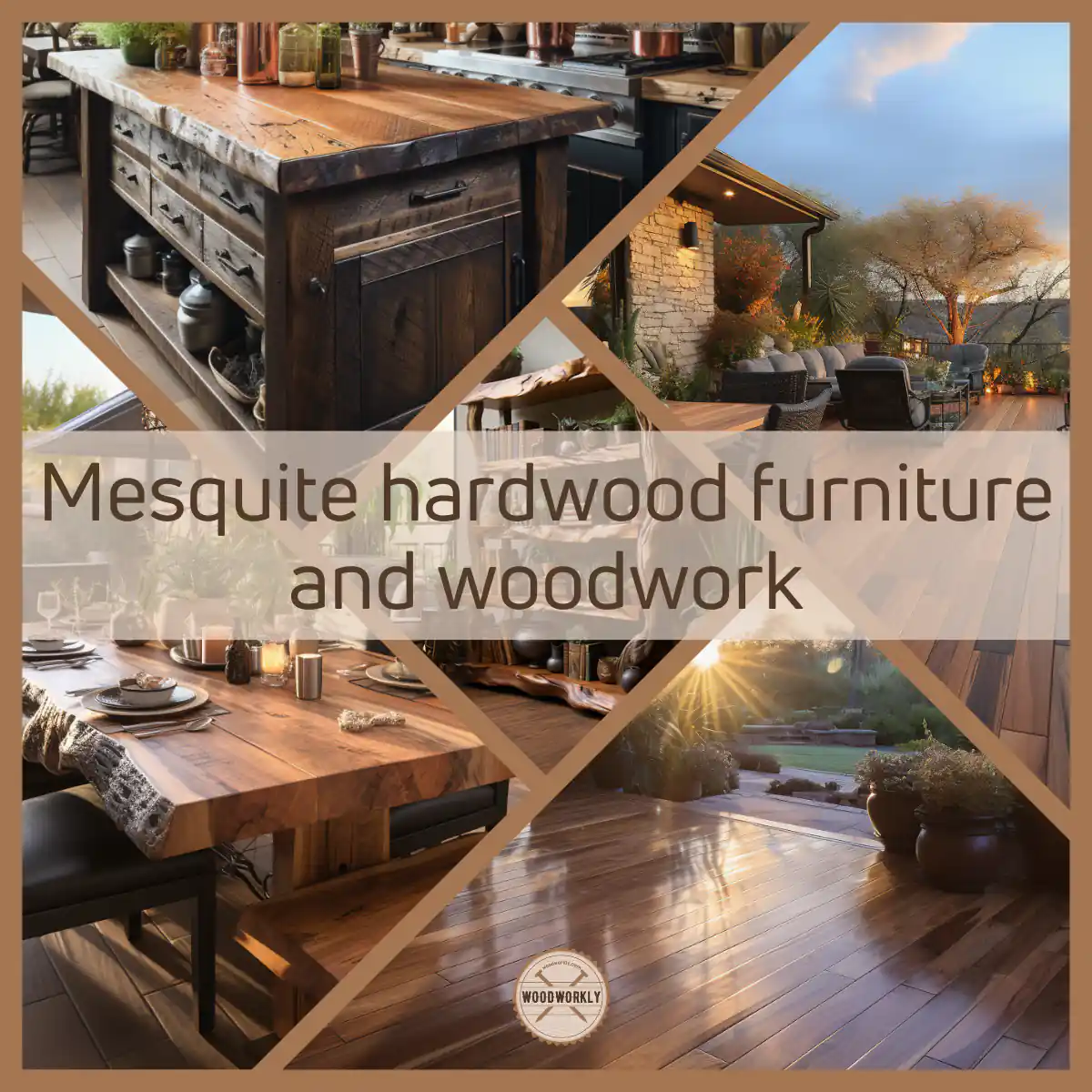
First of all, let’s get a quick overview of Mesquite wood.
What is Mesquite?
Mesquite, often spoken of with reverence among woodworkers and furniture enthusiasts, is more than just a type of wood.
It’s a tale of history, strength, and natural beauty.
Let me take you on a journey to understand this exceptional lumber.
Mesquite’s Origins
Before we dive into the intricacies of its characteristics, let’s travel to where it all begins.
Mesquite trees are primarily native to the Americas, with their roots deeply entrenched in the soils of the Southwestern United States, Mexico, and parts of South America.
They’ve been a part of these landscapes for ages, painting the terrains with their distinctive, spreading canopies.
Remember those BBQs where the aroma of Mesquite wood filled the air?
The same tree, renowned for its flavorful smoke, is also the source of this exceptional hardwood.
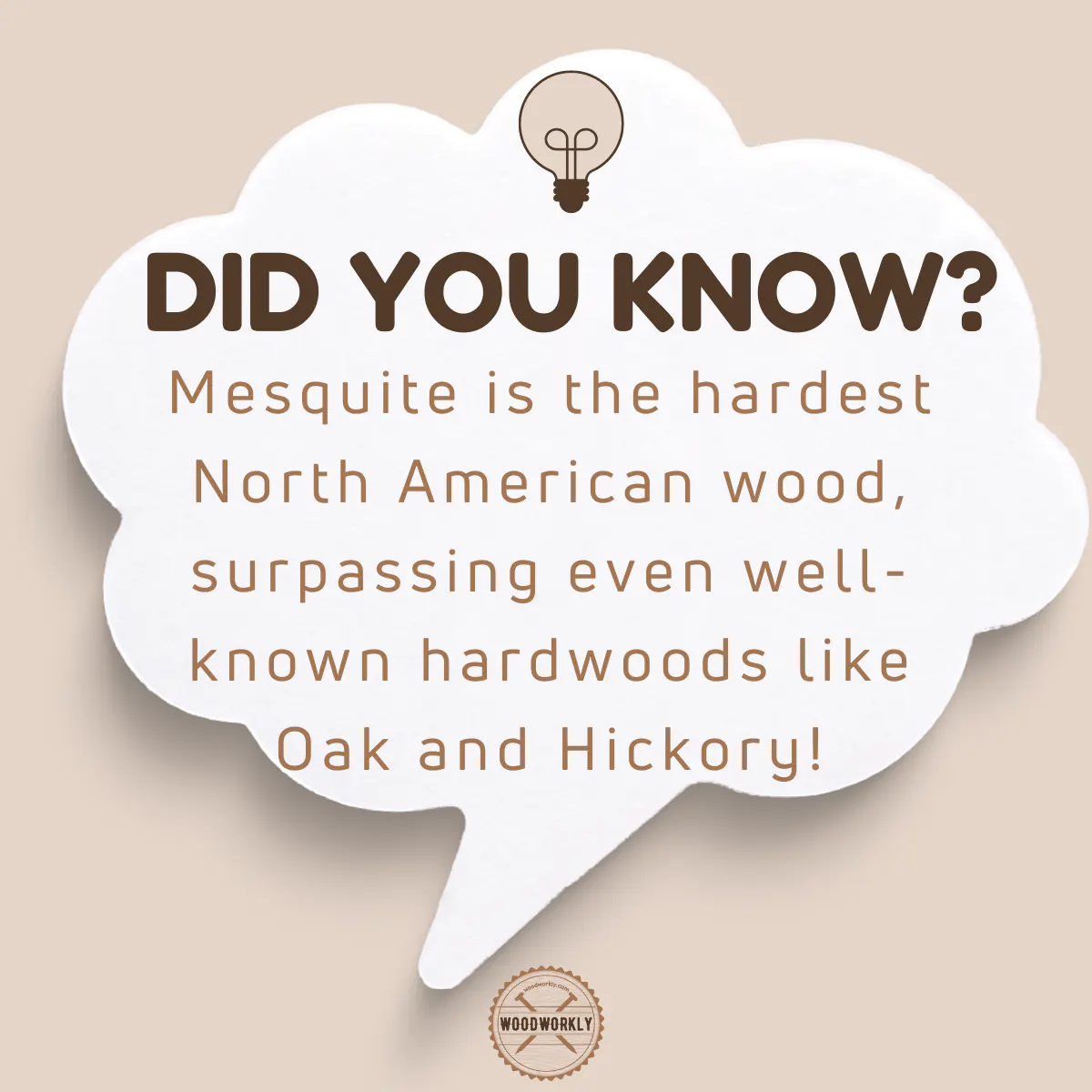
Personal Anecdote: Mesquite in My Workshop
I recall working on a Mesquite bedroom furniture project.
The dense wood was initially intimidating, but as my tools glided through, carving intricate designs, I realized its true nature.
It’s not just hard; it’s workable, versatile, and exceptionally rewarding for craftsmen.
That bedroom furniture? It became the centerpiece of the room, drawing admiration from all who saw it.
How Hard Is Mesquite?
Mesquite is known as the hardest among North American woods. It comes from deciduous trees like other hardwoods, but it is stronger, tougher, and denser than many of the well-known hardwoods.
According to the Janak hardness test, Mesquite has one of the best hardness ratings of 2,340 lbf (10,410 N). This means it is significantly harder than many other hardwoods.
Janka hardness rating is the standard method of measuring the hardness of wood upon its resistance against wear and shear forces.
If a particular wood has high shear and wear resistance, that means its Janak hardness rating is high.
Mesquite has medium to coarse grain fiber structure with wavy or straight grain patterns. The number of wood fibers per single cubic meter is so high.
This makes the wood so much denser and harder.
Mesquite wood is harder than Ash, Hickory, Maple, Beech, Red Oak, and Mahogany. Mesquite is 82% harder than Red Oak.
As you can see it is harder than any hardwood we have known for years.
Because of being hard and dense, the dimensional stability of Mesquite is also significantly higher than most woods. For example, Mesquite is 63% more stable than Red Oak.
You can easily select Mesquite among other woods for any project that has quite great hardness and strength. This is why it is popular in industrial projects as well.
Having excellent hardness is important to make both indoor and outdoor furniture and woodwork. You can use Mesquite furniture for so long with little maintenance.
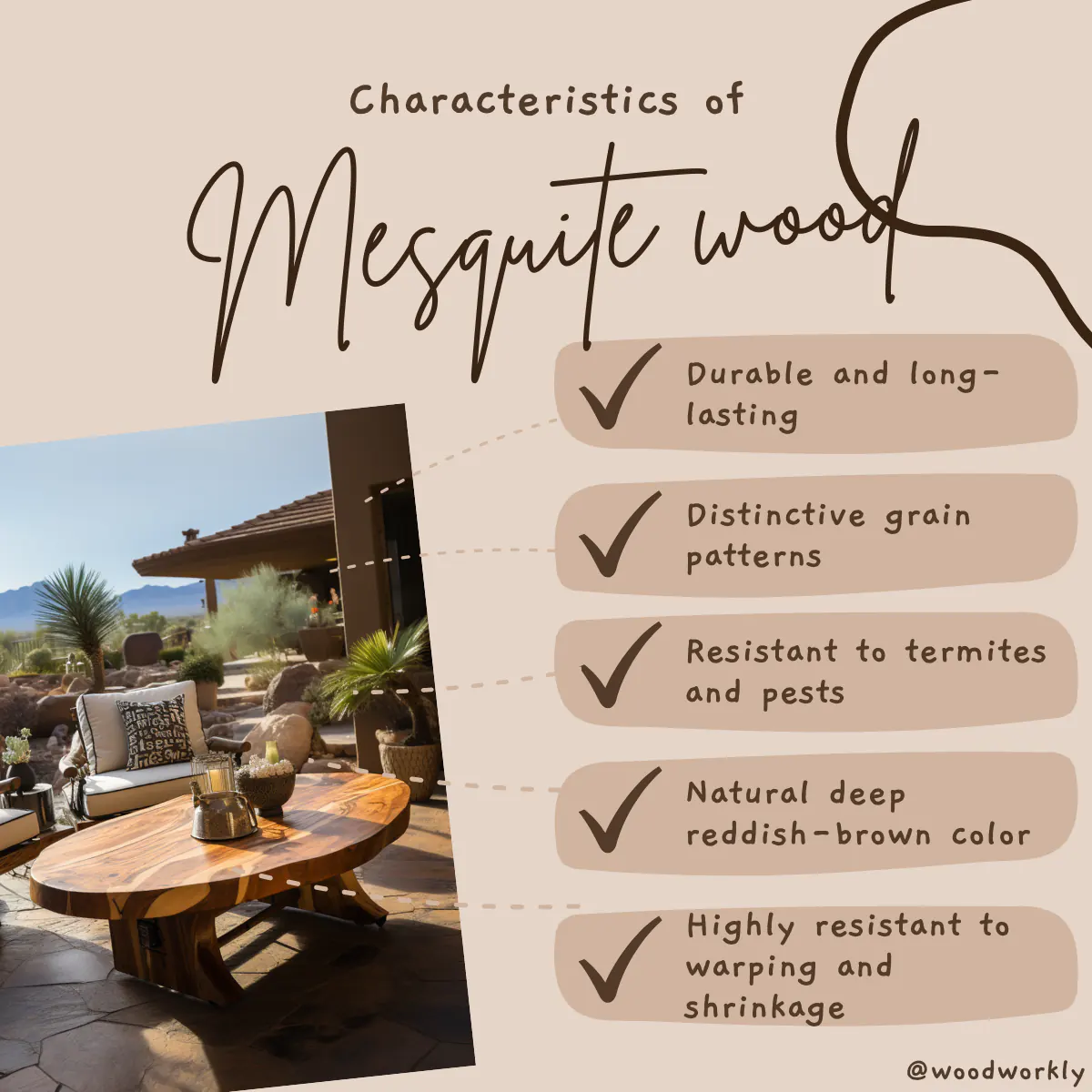
Hardness Of Mesquite Compared to Other Woods
Mesquite wood has a Janka hardness rating of 2,340 lbf (10,410 N) which is excellent. But let’s see how hard Mesquite wood is compared to many other wood types.
| Wood Species | Hardness value |
| Brazilian Walnut | 3,684 lbf (16,390 N) |
| Red Mahogany, Turpentine | 2,697 lbf (12,000 N) |
| Brazilian Cherry, Jatoba | 2,350 lbf (10,500 N) |
| Mesquite | 2,340 lbf (10,410 N) |
| Golden Teak | 2,330 lbf (10,400 N) |
| Hickory, Pecan, Satinwood | 1,820 lbf (8,100 N) |
| Apple wood | 1,730 lbf (7,700 N) |
| Honey Locust | 1,580 lbf (7,030 N) |
| Hard Maple, Sugar Maple | 1,450 lbf (6,400 N) |
| White Oak | 1,360 lbf (6,000 N) |
| Ash (White) | 1,320 lbf (5,900 N) |
| American Beech | 1,300 lbf (5,800 N) |
| Red Oak (Northern) | 1,290 lbf (5,700 N) |
| Yellow Birch / Baltic birch | 1,260 lbf (5,600 N) |
| Teak | 1,155 lbf (5,140 N) |
| Black Walnut, North American Walnut | 1,010 lbf (4,500 N) |
| Cherry | 995 lbf (4,430 N) |
| Black Cherry, Imbuia | 950 lbf (4,200 N) |
| Red Maple | 950 lbf (4,200 N) |
| Larch | 830 lbf (3,690 N) |
| Yellow Pine | 870 lbf (3,870 N) |
| Douglas Fir | 710 lbf (3,158 N) |
| Silver Maple | 700 lbf (3,100 N) |
| Willow | 570 lbf (2,530 N) |
| Hemlock | 540 lbf (2,402 N) |
| Black Spruce | 520 lbf (2,313 N) |
| Cypress | 510 lbf (2,269 N) |
| Cottonwood | 430 lbf (1,913 N) |
| Redwood | 420 lbf (1,868 N) |
| Basswood | 410 lbf (1,823 N) |
| Engelmann Spruce | 390 lbf (1,735 N) |
| Sugar Pine | 380 lbf (1,690 N) |
| White Pine | 380 lbf (1,690 N) |
| Aspen | 350 lbf (1,557 N) |
| White Cedar | 320 lbf (1,423 N) |
As you can see Mesquite is placed well above most hardwoods. It has all the premium qualities considered hardwood.
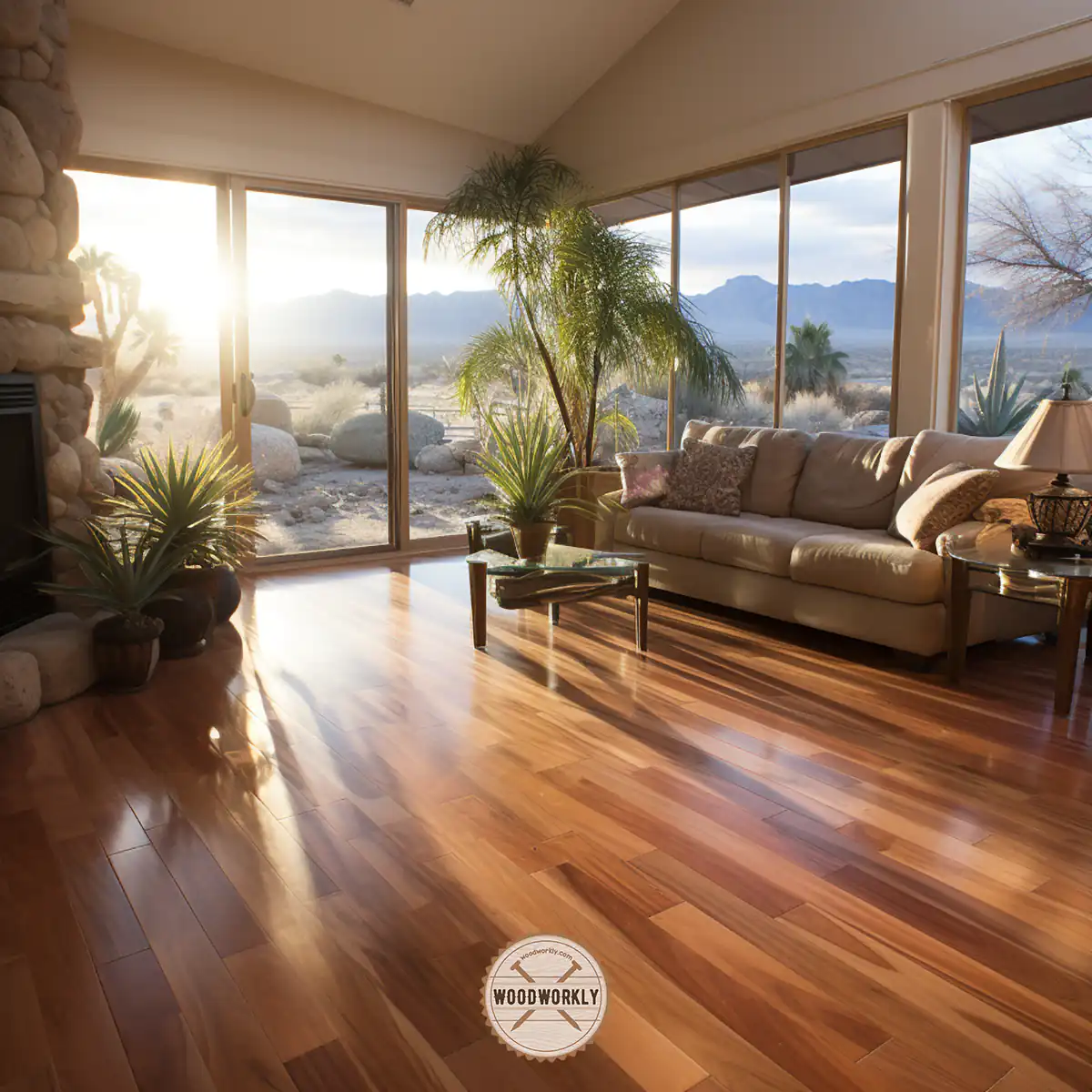
Let’s see some characteristic features of Mesquite as a hardwood.
Mesquite Wood Characteristics
Mesquite wood is such a beautiful wood with reddish-brown heartwood which darkens into a unique luxurious color with age.
This brings a unique appearance to your furniture.
Mesquite has a diffuse porous structure with a normal space between wood fibers.
As you, there are so many woods with incredibly high hardness values, but when it comes to the outdoor world, they rot and decay quite easily due to environmental elements like moisture, temperature changes, UV light, insect attacks, and a lot more.
But Mesquite is quite impressive. It has excellent rot and decay resistance which is so useful when it comes to outdoor projects.
Mesquite is surprisingly more durable than many other kinds of wood on the planet.
Therefore, Mesquite is able used for outdoor furniture. The wood can withstand moisture, temperature changes, and harsh weather conditions.
But I highly recommend you apply a proper quality sealant over Mesquite for better protection.
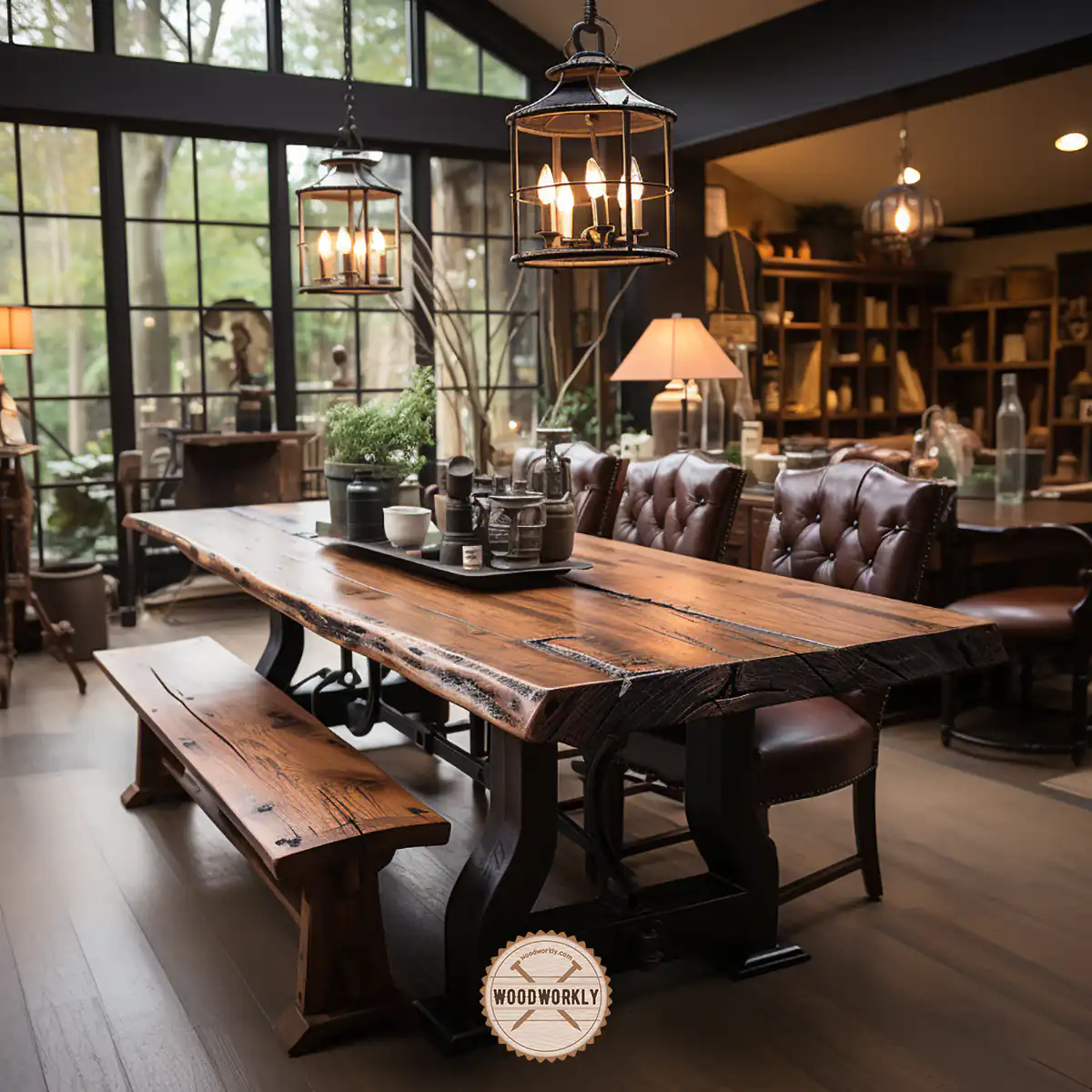
After applying a quality sealant on Mesquite furniture or woodwork they will easily last for a lifetime with no issues. They only need very little maintenance from time to time.
When it comes to working, Mesquite is surprisingly easy to work with. Most woods with great hardness and density are difficult to work with because of their toughness.
But working with Mesquite is quite easy with both hand tools and power tools. You can cut, screw, drill, or nail Mesquite wood easily.
This is because Mesquite is a quality that is free from defects.
But areas with irregular grain patterns and knots make working a little bit difficult. But it can be fixed by selecting a straight-grain Mesquite wood for your projects.
Finishing, staining, sealing, and gluing Mesquite wood is also easy because of its excellent finishing properties.
Because of being durable, hard, and dense with high workability and excellent weather resistance Mesquite is one of the best wood for furniture and other woodworking projects.
Mesquite is a great wood even for a beginner in woodworking. It is so difficult to tell the drawbacks of this amazing wood.
Here are the most significant qualities of Mesquite wood,
- Hardwood
- Excellent durability
- High rot and decay resistance
- Darkens over time
- Easy to work with
- High density
- No characteristic odor
- Easy to finish and stain
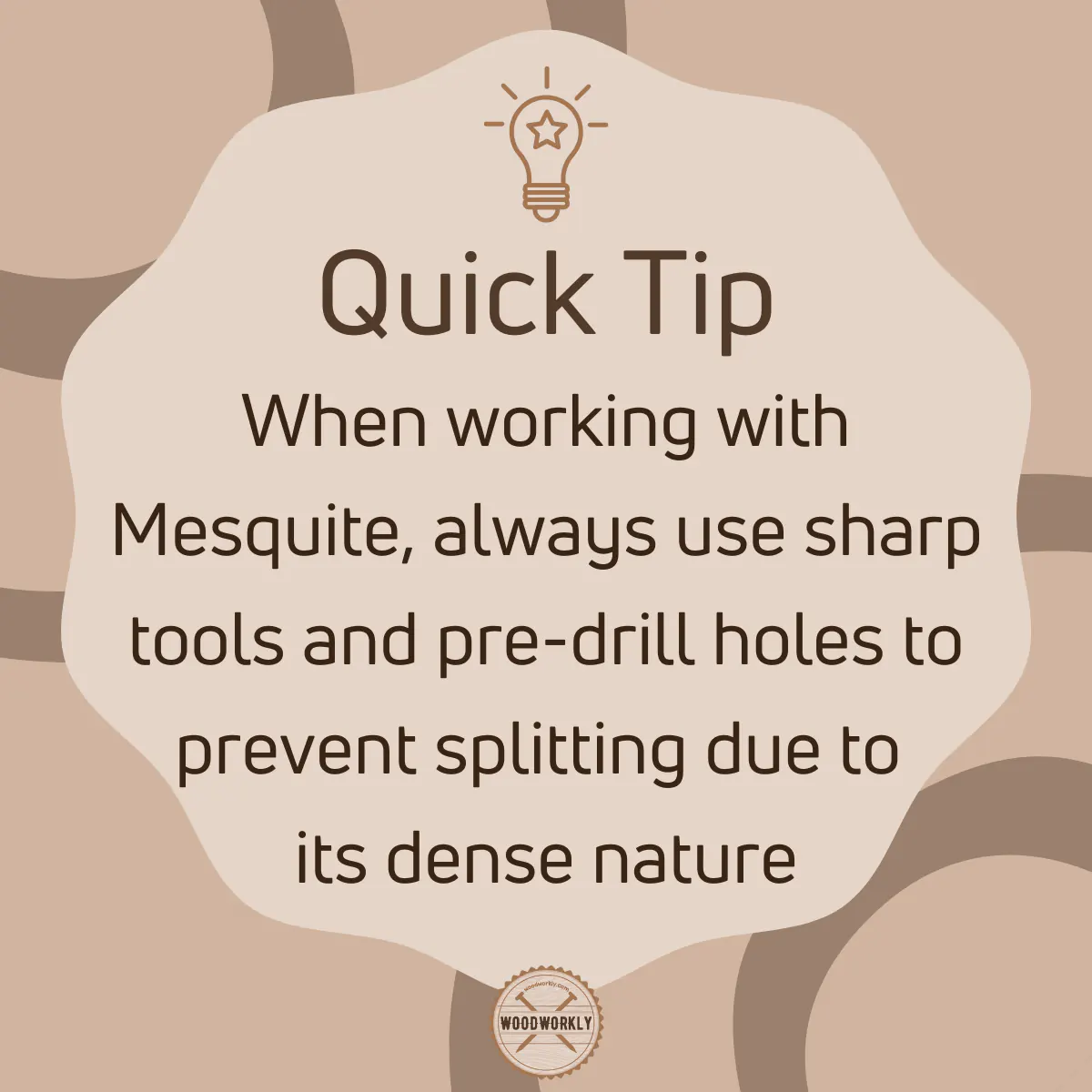
Properties Of Mesquite Wood
Here are the main characteristic features of Mesquite wood.
| Color | Reddish brown darkens with age |
| Density | 820 kg/m3 |
| Hardness | 2,340 lbf (10,410 N) |
| Wood Type | Hardwood |
| Applications | Fencing, Furniture making, Flooring |
So, let’s have a look at some advantages and disadvantages of using Mesquite wood.
Pros And Cons Of Mesquite Wood
| Pros | Cons |
| Excellent hardness and density | Less availability |
| High durability | Moderately expensive |
| High workability | |
| Easy to finish | |
| Rot-resistant | |
| Decay resistant | |
| Attractive wood color | |
| No characteristic odor |
As you can see there are lots of benefits of using Mesquite over other wood despite being rare. It is one of the most underrated woods on the planet.
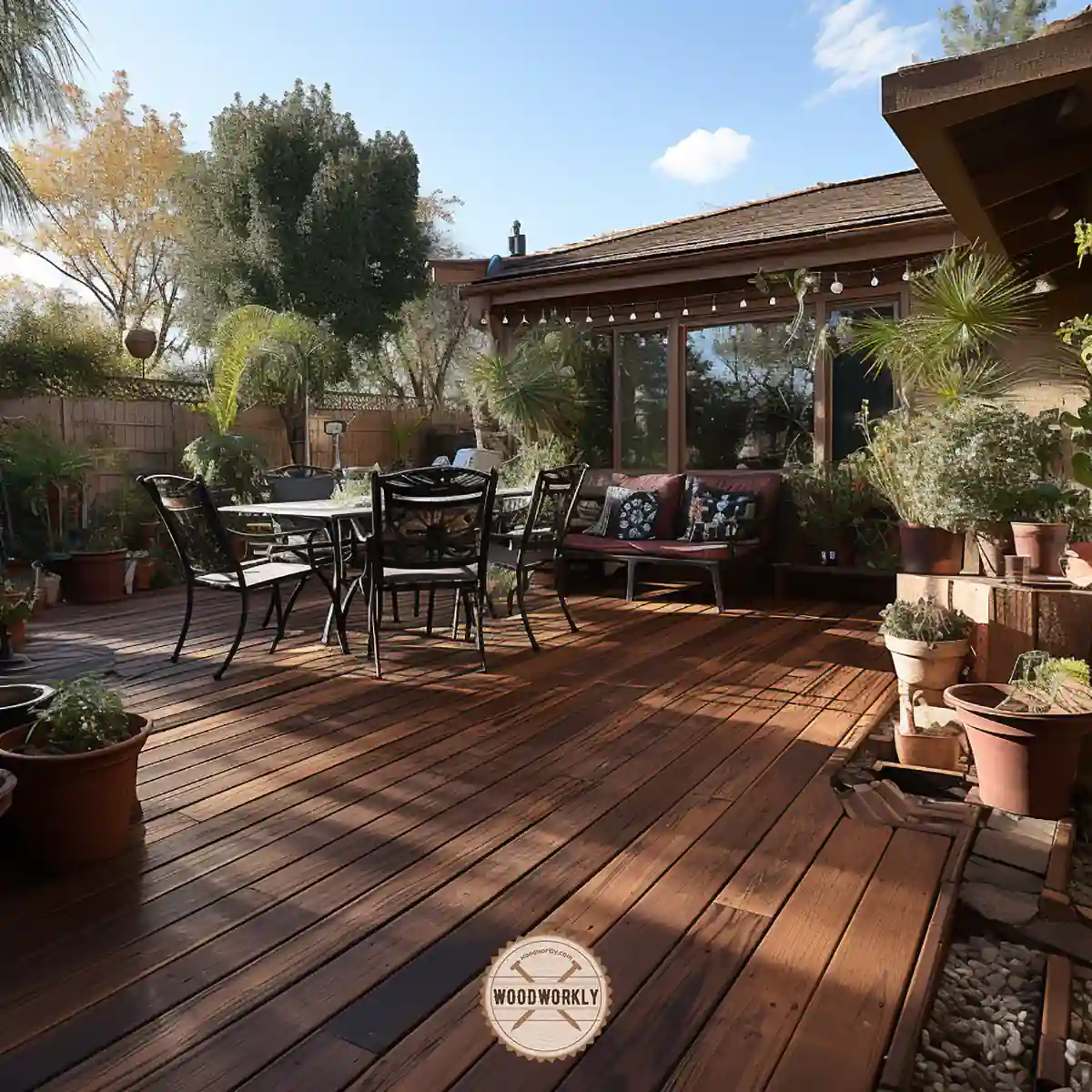
Let’s see some applications of Mesquite wood.
What Is Mesquite Wood Used For?
Mesquite wood can be used literally for any woodworking project without worrying about its stability, strength, density, or hardness.
It does an exceptional job as a hardwood for the woodworking field. Mesquite is great for both indoor and outdoor woodworking projects due to its high weather resistance.
Here are some popular applications of Mesquite wood,
- Making indoor and outdoor furniture
- Residential projects
- Industrial projects
- Fencing
- Flooring
- Wood carving projects
- Wood turning projects
- Cabinets
- Paneling
- Doors making
- Knife handles
As you can see the clear reason behind the versatility of Mesquite wood. It is a top-rated hardwood with lots of benefits.
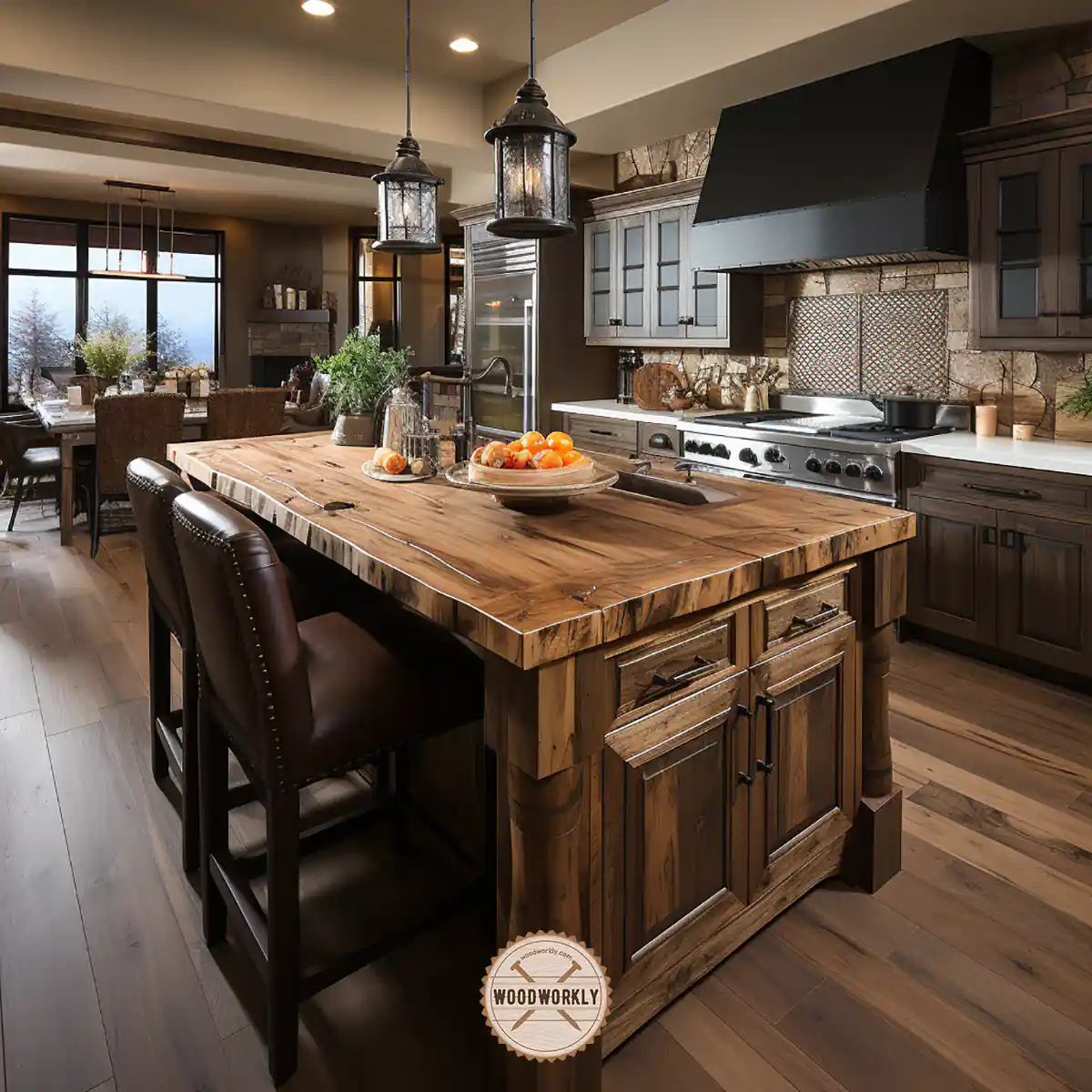
How Strong Mesquite Wood Is?
Mesquite is one of the strongest hardwood types on the planet. You can use Mesquite wood for any project that carries a heavy load and force. It won’t break quite easily as softwoods.
Mesquite has exceptional density and high dimensional stability which is useful to keep the wood steady even when the forces are applied on.
The crushing and bending strengths of Mesquite wood are impressive.
The compressive strength and bending strength of Mesquite wood are as follows,
- The compressive strength of Mesquite wood is 67.3 Mpa
- The bending strength of Mesquite wood is 115.5 Mpa
Having high bending strength is super useful when softening wood with steam and for woodturning and carving projects.
You can shape and cut the Mesquite wood easily without chipping, warping, or splitting the wood.
Overall, Mesquite wood is stronger and heavier than Hickory and Oak.
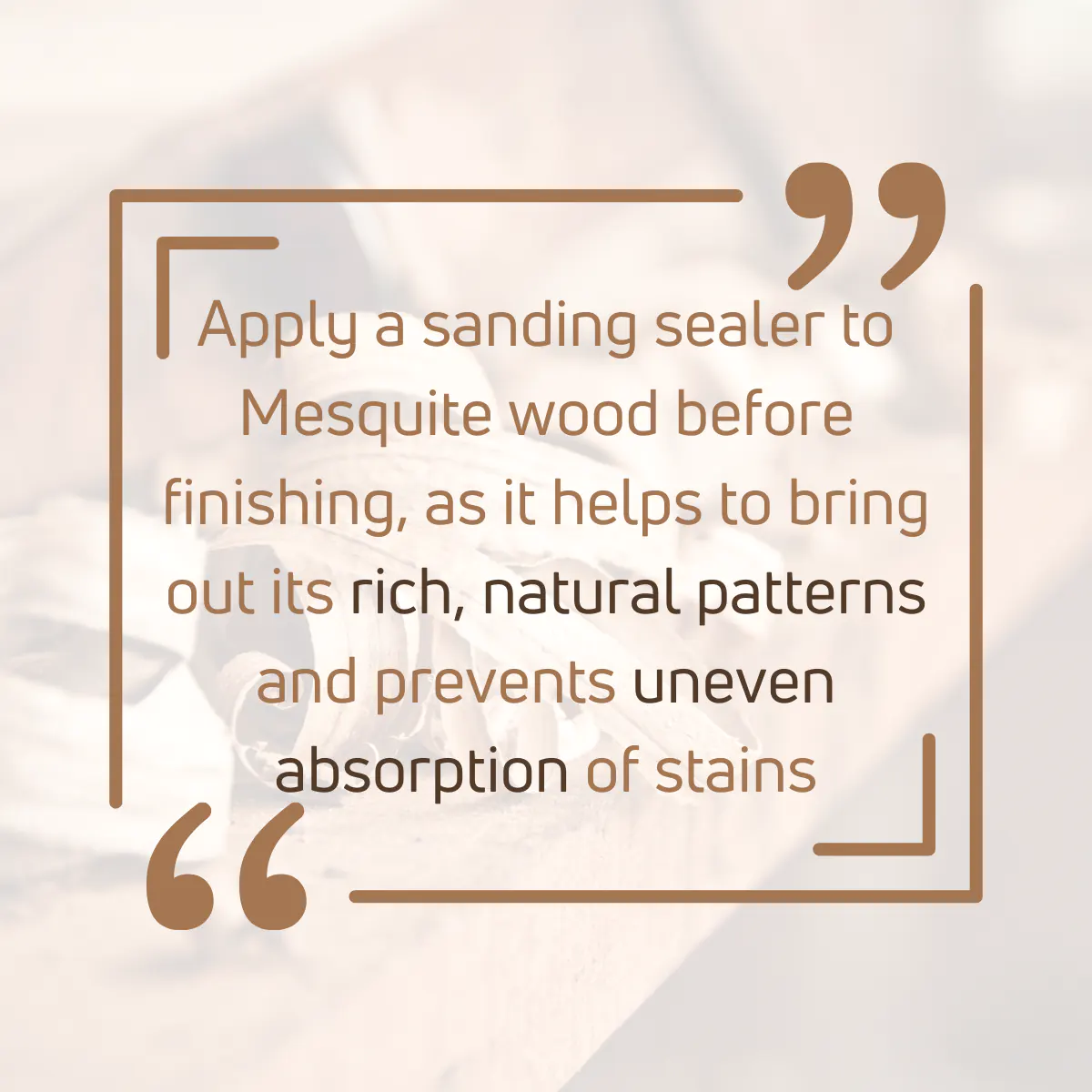
Tips For Working With Mesquite Hardwood
Ah, Mesquite! Its rich hues and enduring nature might tempt anyone into creating a masterpiece.
But working with this hardwood is no walk in the park. Lucky for you, I’ve wrestled, er, worked with Mesquite enough to share some golden nuggets of wisdom.
So, roll up those sleeves, because here are some practical tips to make your Mesquite woodworking journey smoother!
The Mesquite Basics
Firstly, let’s get to know our ‘subject’ a bit more. Mesquite, as we’ve established, is one tough cookie.
This means it’s both rewarding and challenging.
Grain Patterns:
Mesquite’s grains can be whimsical. Sometimes straight, often wavy, and occasionally rebellious. Recognize this, and you’ll avoid many a headache.
Moisture Content:
Like a sponge that’s decided it won’t sop up anymore, Mesquite can be a bit resistant to absorbing moisture.
Thus, seasoning this wood properly is crucial. If not, you might end up with unwanted cracks or warps.
Equip Yourself: The Right Tools
Sharp Blades:
I can’t emphasize this enough.
On a sunny day in my workshop, after working with softer woods, I decided to give Mesquite a try without changing my saw blade.
The result? A chipped blade and a bruised ego. Mesquite’s hardness demands sharp blades.
So, always ensure your tools are at their sharpest when working with this wood.
Sturdy Clamps:
During another Mesquite misadventure, I realized my regular clamps weren’t cutting it.
Mesquite’s density requires sturdier clamps to hold it in place. Invest in quality clamps, and thank me later!
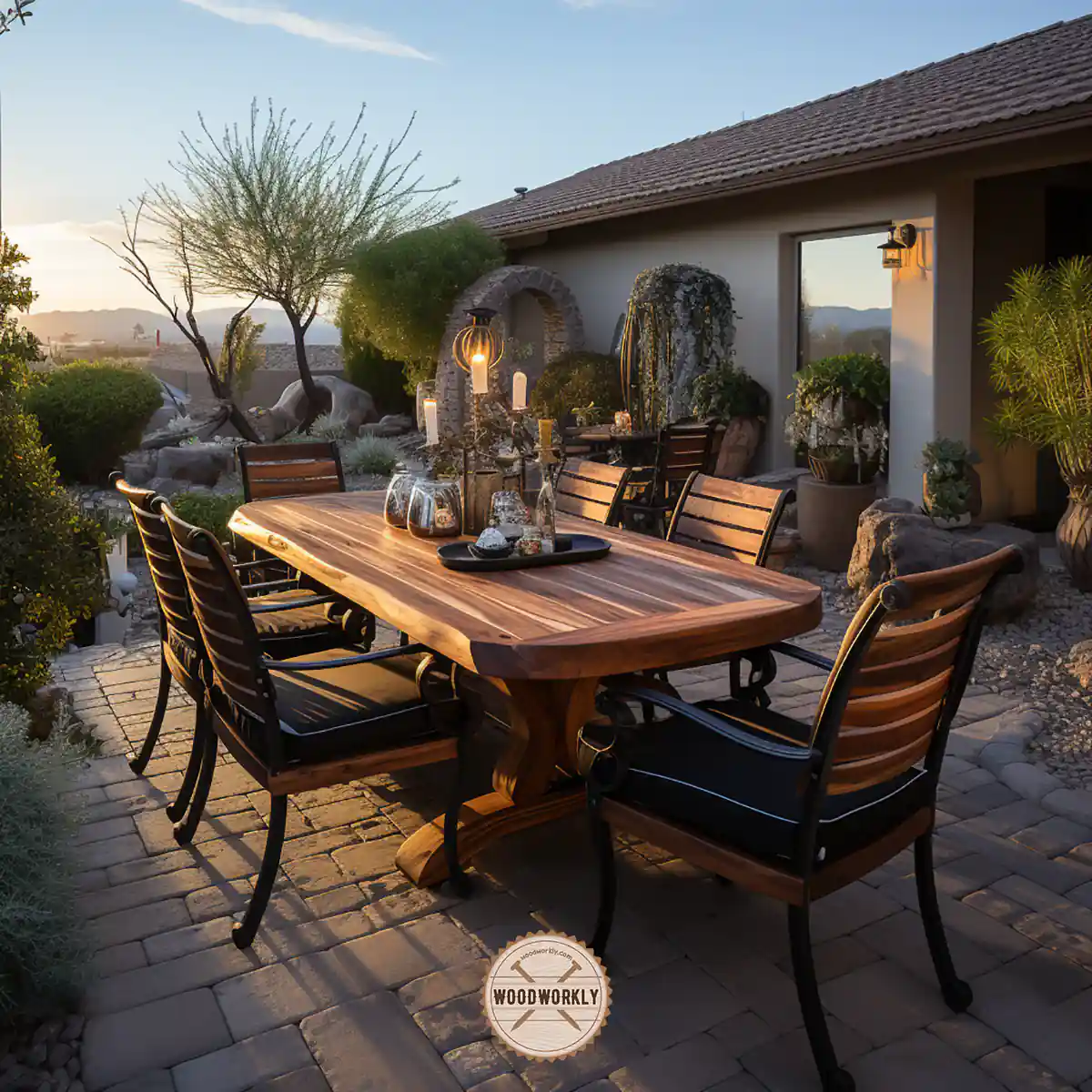
Handling Mesquite: Techniques Matter
Slow and Steady:
It’s not a race! I’ve learned that you have to take your time with Mesquite.
Rushing might result in burns on the wood or uneven cuts.
Trust the process and let the beauty of the wood shine through.
Sanding and Finishing:
Mesquite’s grains can be quite unpredictable. This means regular sanding techniques might not work as well.
I remember spending an entire afternoon trying to get a smooth finish until I decided to use a combination of hand sanding and a random orbital sander.
The outcome? Silky smooth Mesquite, ready to be shown off!
One time, I was so engrossed in creating a Mesquite coffee table, I forgot to check for wood tension.
As I made my cut, the wood snapped back, ruining hours of hard work. I was devastated.
But here’s the thing – Mesquite, like all things precious, requires patience and understanding.
Every mistake, including mine, is an opportunity to learn.
That’s it, folks! Hope you know everything you wanted to know about, is Mesquite a hardwood?
So, let’s compare hardness of Mesquite some other woods.
Is Mesquite Harder Than Oak?
Yes, Mesquite is harder than Oak. Both Red Oak and White Oak are softer, less dense, and weaker than Mesquite wood.
Therefore, you can easily replace Oak with Mesquite considering their hardness.
According to the Janka hardness ratings, the hardness of Mesquite and Oak are as follows,
| Wood Type | Hardness |
| Mesquite | 2,340 lbf |
| Red Oak | 1,290 lbf |
| White Oak | 1,360 lbf |
Is Mesquite Hard To Split?
Mesquite is a little bit hard to split because of its tight grain structure, high density, and hardness.
But splitting Mesquite is easier than many hardwoods because of its straight grain structure. You can use Mesquite wood as firewood.
You need to have a well-sharpened axe and try to split Mesquite when it is greener since it will be much easier to split when the wood is fresh.
Is Mesquite Harder Than Hickory?
Mesquite is harder than Hickory. Mesquite is heavier, stronger, denser, and more durable than hickory. It is one of the hardest wood among North American hardwoods.
Therefore, you can easily replace Hickory with Mesquite considering their hardness.
According to the Janka hardness ratings, the hardness of Mesquite and Oak are as follows,
| Wood Type | Hardness |
| Mesquite | 2,340 lbf |
| Red Oak | 1,820 lbf |
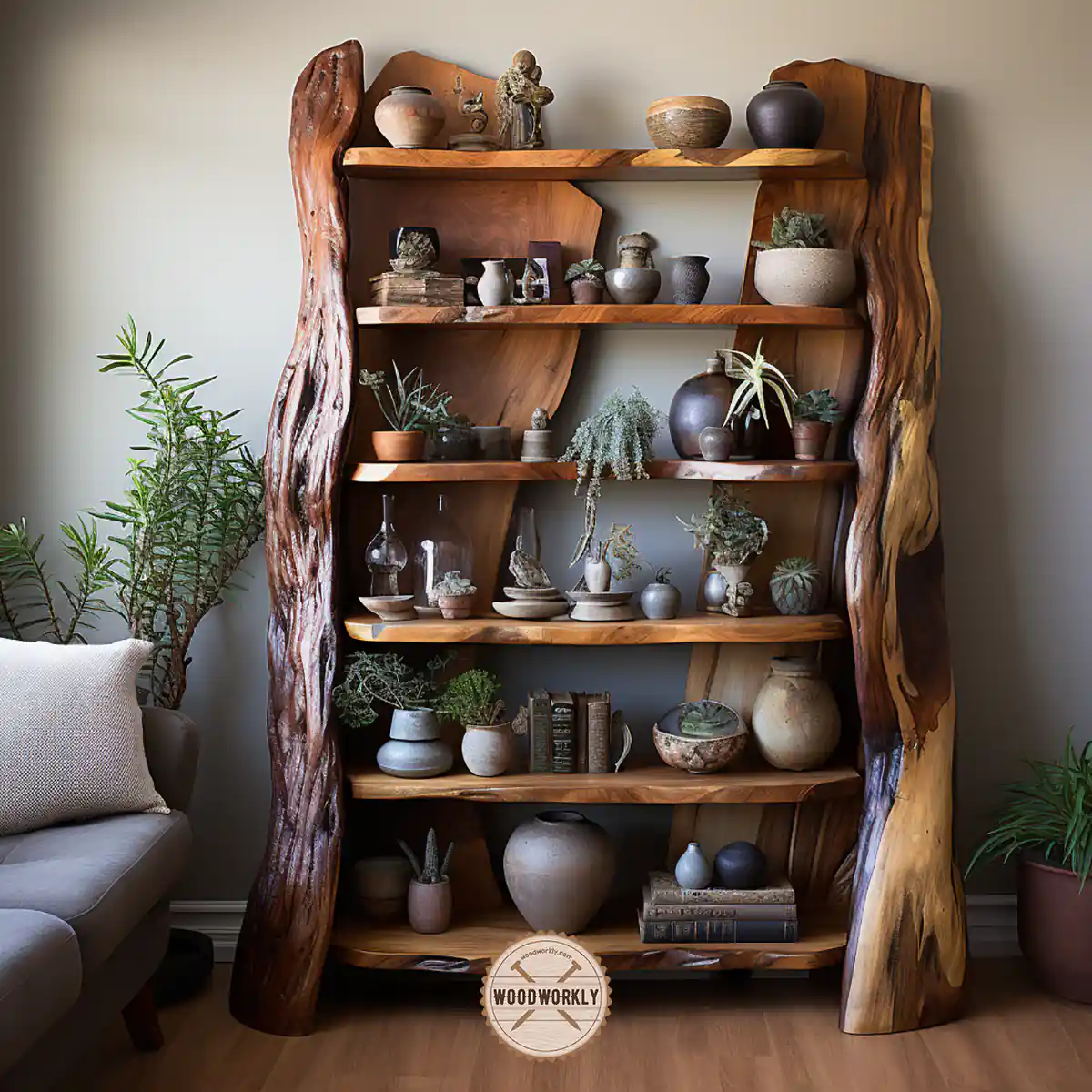
Let’s answer some frequently asked questions.
FAQs
Can Mesquite be used for outdoor furniture?
Yes, indeed! Mesquite’s natural resistance to pests and rot makes it a prime candidate for outdoor creations. Just ensure it’s well-seasoned to avoid any weather-related warping.
Is Mesquite wood expensive?
Compared to some common hardwoods, Mesquite can be pricier. Its durability, unique grain patterns, and limited availability contribute to its premium status in the world of woodworking.
Does Mesquite wood burn easily?
Surprisingly, given its hardness, Mesquite burns relatively quickly if not monitored. That’s why it’s a popular choice for smoking meats, giving them that distinct flavor we all love!
Can you paint over Mesquite?
You can, but with such a rich and beautiful grain, many opt to stain or oil it instead. Painting might conceal its natural charm, so choose your finishes wisely!
Is it hard to carve designs into Mesquite?
Given its dense nature, carving Mesquite can be a challenge. However, with sharp tools and patience, it’s possible to achieve intricate designs, making the effort totally worth it!
How does Mesquite fare against termites?
Termites aren’t big fans of Mesquite! Its natural resilience makes it a less appealing munch for these pesky critters, giving your creations a longer, termite-free life.
Did I cover all you wanted to know about: Is Mesquite A Hardwood?
In this article, I have deeply discussed, whether is Mesquite a hardwood and how hard Mesquite is compared to other popular wood types like Hickory and Oak. The characteristic features of Mesquite wood with pros and cons.
Mesquite is a hardwood with extremely high density, toughness, and strength. It has a Janka hardness rating of 2,340 lbf (10,410 N) which is significantly harder than any North American hardwood. Because of its being hard and durable, Mesquite is used for commercial and large construction projects.
Furthermore, I’ve answered some frequently asked questions as well.
Hope you have gained good knowledge about the hardness of Mesquite wood.
Now you know, is Mesquite a hardwood or softwood. try to use it for your next woodworking project and experience its hardness in a practical scenario.